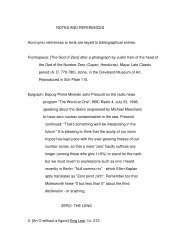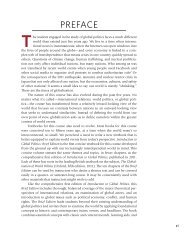1 Political authority and obligation Political authority and obligation
1 Political authority and obligation Political authority and obligation
1 Political authority and obligation Political authority and obligation
You also want an ePaper? Increase the reach of your titles
YUMPU automatically turns print PDFs into web optimized ePapers that Google loves.
<strong>Political</strong> <strong>authority</strong> <strong>and</strong> <strong>obligation</strong> 17<br />
reasonably challenge the hypothetical consent theorist to explain why we should care what<br />
it would be rational for us to do, when, in reality, we might prefer to act irrationally. If the<br />
hypothetical consent theorist replies along the lines of, ‘Because it is in your best interests<br />
to do what it is rational to do’, then it looks like his or her argument for political <strong>authority</strong><br />
<strong>and</strong> <strong>obligation</strong> appeals to the benefi ts that the state brings, rather than on the moral importance<br />
of consent. But if the hypothetical consent theorist’s argument relies ultimately on the<br />
benefi ts that the state brings, then the hypothetical consent seems to drop out of the picture—that<br />
is, we might as well seek to justify political <strong>obligation</strong> <strong>and</strong> <strong>authority</strong> by direct<br />
reference to the benefi ts that the state brings. In the next section, we will look at precisely<br />
this possibility.<br />
KEY POINTS<br />
● Consent theorists claim that we should obey the law, because we have consented to do so.<br />
● Modern consent theorists rely on the Lockean notion of tacit consent. Tacit consent has been<br />
interpreted in different ways, but is most usefully interpreted as consent by doing something<br />
that you would not otherwise be permitted to do, because someone has a right that you not<br />
do that thing without thereby consenting.<br />
● Some consent theorists argue that residence in a geographical territory counts as tacit consent<br />
to obey the law. One objection to this claim says that we are not free enough to leave our<br />
country of birth for our residence to count as effective consent. Another objection suggests<br />
that residing on one’s own l<strong>and</strong> is not a prohibited act <strong>and</strong> cannot therefore count as tacit<br />
consent.<br />
● Some consent theorists argue that voting in a democratic election counts as tacit consent<br />
to obey the law. But as long as those who do not vote are forced to obey the law despite<br />
their abstention, it seems reasonable to treat voting as coerced, <strong>and</strong> therefore ineffective,<br />
consent.<br />
● Hypothetical consent theorists argue that we would consent to set up a state <strong>and</strong> obey the<br />
law if the state did not already exist. The diffi culty for hypothetical consent theorists is to<br />
explain why it should matter morally what we would do, rather than what we have, in fact,<br />
done.<br />
Utilitarianism<br />
One reason to think that we should obey the law regardless of the presence or absence of<br />
consent is that obedience to the law allows the state to exist <strong>and</strong> that the existence of the<br />
state brings many benefi ts. We have roads down which to drive, police to keep the peace<br />
within our borders, <strong>and</strong> armies to protect our borders. Some of us a re lucky enough to<br />
enjoy access to free or heavily subsidized health care <strong>and</strong> education. Are these benefi ts not<br />
themselves suffi cient justifi cation for political <strong>authority</strong> <strong>and</strong> <strong>obligation</strong>?<br />
Th e answer to this question is both ‘yes’ <strong>and</strong> ‘no’. For those who want to act in ways that<br />
benefi t society, the benefi ts that the state brings will provide a reason to obey the law. But

















